The
Helmet
Pilots are wearing the German version of the HGU-55P helmet called HGU-55G. It is
basically the same helmet but with a different visor and communications setup. The HGU-55G
helmet comes in three sizes, medium, large and extra large. The helmet has a grey leather
edgeroll and grey leather earcushions (elephant ears). The liner used is a two piece liner
which is custom fit and covered with grey leather also. The helmet has a black neck strap
and a black chin strap. The receivers used are the normal lightweight type. The
communications cord is the standard CX-4708A/AIC cable but with a slightly different plug.
The visor consists of the distinctive German cover and a dual visor. The dark visor comes
in two grades of protection, 15 or 25 percent, it is activated by a knob on the left hand
top of the visor cover. The clear visor has a knob on each side and is activated by
pushing one knob in and pulling the visor down. The other knob is only there to support
the pulling down. 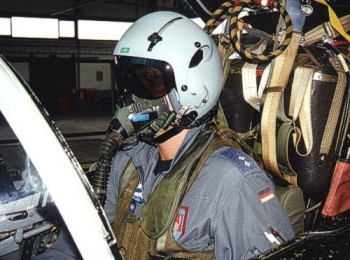
The Mask
Used on the HGU-55G is the German version of the MBU-5P, This mask has a black hardshell
instead of the common green one. Also noteworthy is the communications cord which runs
from the mask to the end of the oxygen hose, being normally coiled the German Luftwaffe
prefers a straight version.
The MBU-5P is connected to the helmet with two J type bayonets. The one on the right hand
side opens as usual but the left-hand side is equipped with the WEA device (Wasser
Entreglung Aktiefierungs Einheit), or water activated opening device. This device contains
a tablet that solves in water and that activates a spring to push the bayonet from the
retainer. It only opens a little, just enough to prevent the pilot from drowning. When the
mask would be still on the pilot's face, there is a chance of breathing water trough the
oxygen hose.
The flightsuit
Worn is a grey fire resistant flightsuit made of Aramid.
The Life Preserving/Survival Vest
The life preserver annex survival vest worn by the Phantom jocks is called the Secumar.
Two versions are in use. The Secumar 10-HL is used on over water flights. The 10-HL has a
double set of bladders, one to be inflated manually and the other is water activated. The
system used on the latter is fairly similar to the WEA device. This time it is called the
Secumatic 10 but operates also by using a tablet. The bladders can be inflated oral also.
The other vest is called the SW-2 and is used over land only. It does not have the life
preserver installed but contains only a part of the survival equipment. The main item on
both the vests is the MR-506 emergency radio with the SWA-2 antenna. It is a two-way
system, able of giving a continuing signal and can be used to transmit voice messages
also. The radio is waterproof to a debt of 60 meters and can operate for approximately 24
hours as a beacon. When used as a two-way radio it operates for around 17 hours. Also
contained in the survival pouches is a line-cutting knife. This is used to cut the
parachute lines after ditching.
G-suits
In use are two types of g-suits. The oldest is the CSU-3P and comes in orange. The
newer version is the green standard CSU-13B/P. The German g-suits are having a single
zipper and the hose is situated on the right hand side (on the Tornado left hand side!).
It also has one knee pocket with a see trough part to stow away items that need to be seen
during flight.
Wet suit
When flying over sea, the pilot is wearing a suit known as the Mk-10. This suit contains
of underwear and a protective suit. It has a hole for the g-suit hose as these are worn
underneath.
Seat Container
The Martin Baker ejection seat used in the Phantom has a container that holds a boat
and two pouches with survival equipment. The boat is the ARZ-16/BW and is inflated
automatically. The upper part of the boat needs to be inflated manually. The survival
equipment consists of water, knife, magnesium, first aid kit, signaling mirror and more
useful items. |
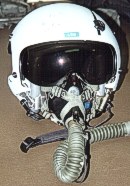
the HGU-55G helmet
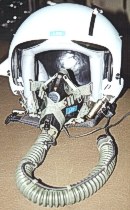
another view of the helmet
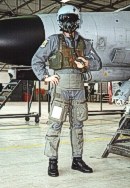
the 'overland' flightgear
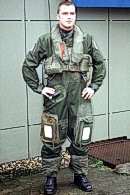
the pilot in his wetsuit
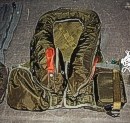
Secumar 10-HL

an inflated Secumar 10-HL

the SW-2 vest
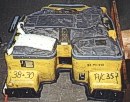
the seat container
|